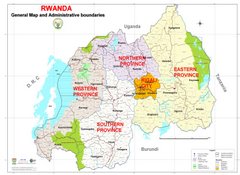Emmanuel Mungwarakarama
17 January 2007
It’s 8:30 on Wednesday. Normally it’s working hours. Butare town is quiet and people are closing shops and offices. They almost are running out of time. They are late. In Butare town all activities are supposed to be suspended from 8:00 to 16:00. In every cell of Butare, people must attend gacaca activities
More than 1million Rwandans perished in the 1994. Orphans, victims and widowers are waiting for justice to be done and try the perpetrators. Prisons are full of suspected people, placing a huge burden on the normal court system.
It was therefore necessary to set up a kind of justice system, inspired by the traditional Rwandan system of settling disputes. This system requires the participation of every one to rebuild justice, because it is in that participatory manner that the crimes were publicly committed in the eyes of the population.
The law establishing the organization, competence and functioning of gacaca stipulates in that every Rwandan citizen has the duty to participate in the Gacaca court activities..
The process began in the country 15 January 2005 in 3 stages: data collection in 2 phases and an information validation stage. The trial phase began in April 2006. The total number of suspects by Gacaca is approximately 761 448, according to the official website by the gacaca courts national commission (www.inkiko-gacaca.gov.rw). It is recommended that by the end of 2007 all trials be completed.
By 9:06, committee of 9 persons of integrity with 3 women among them is sitting at the front of the room. The chairperson gives directives:
“No cell phone during the session, it must be ordered. Every one is free to give his point of view, ask a question or to contribute to what has been said,” he said. “You have to raise your hand and be given a word.”
The chairman calls upon the seven witnesses – 4 women and 3 men. Before they give their testimonies; each must take an oath in the name of God. The accused are seated in front of the audience, a guard is standing alongside the room with a gun. The number of attendants in the room is approximately 120.
Among them are teachers at the secondary schools, professors at the university, businesspersons, and peasants.
Some are concentrating on the proceedings, others are reading the newspapers, and even some are sleeping. It seems that the testimonies might not be interesting. Cell phones are ringing time to time.
Among witnesses, there is a sister by the names of Micheline Mukayibanda born in 1955 at Cyangugu, who served at the orphanage in Butare since 1990. Her testimony makes people shout in anger. The chairman and the committee ask many questions, but the sister has no sufficient and interesting answers, and people don’t believe her. After a short time while Michel Ndejuru is being interviewed, Micheline, the sister starts crying and goes out of the room, perhaps after remembering some details she omitted or forgot to give.
Michel, who was 16 at the time, participated actively in the killings, he said, and is accused of murdering 450 people. His father was killed during the genocide.
“I am really sorry to all what I did. I was a part of group who killed Claudine. I beg a pardon in front of you all and the entire Rwandan society,” he declared confidently.
He was arrested on May 3, 1995 and released from prison by the presidential instruction in 2006.
By mid-morning, the room is full of people, the number attending is double.
By noon all testimonies are finished and the accused have to defend themselves without a lawyer, which is the tradition in gacaca.
The trials must go on until 1600 without interruption, it is tiresome and people are annoyed by this. They start shouting, going out and back to their seats.
Wednesday, February 7, 2007
Subscribe to:
Post Comments (Atom)
Rwanda

Administrative map
Blog Archive
-
►
2010
(59)
- ► 09/19 - 09/26 (1)
- ► 07/11 - 07/18 (5)
- ► 07/04 - 07/11 (5)
- ► 06/27 - 07/04 (4)
- ► 06/20 - 06/27 (6)
- ► 06/06 - 06/13 (17)
- ► 05/30 - 06/06 (4)
- ► 03/28 - 04/04 (2)
- ► 02/28 - 03/07 (3)
- ► 02/21 - 02/28 (5)
- ► 01/24 - 01/31 (2)
- ► 01/17 - 01/24 (4)
- ► 01/10 - 01/17 (1)
-
►
2009
(25)
- ► 11/08 - 11/15 (9)
- ► 10/04 - 10/11 (2)
- ► 01/25 - 02/01 (2)
- ► 01/18 - 01/25 (12)
-
►
2008
(55)
- ► 12/28 - 01/04 (1)
- ► 12/21 - 12/28 (11)
- ► 12/14 - 12/21 (3)
- ► 12/07 - 12/14 (5)
- ► 11/30 - 12/07 (2)
- ► 11/16 - 11/23 (22)
- ► 11/09 - 11/16 (4)
- ► 07/13 - 07/20 (1)
- ► 06/01 - 06/08 (6)
-
▼
2007
(19)
- ► 05/20 - 05/27 (2)
- ► 04/01 - 04/08 (1)
- ► 03/04 - 03/11 (1)
- ► 02/25 - 03/04 (2)
- ► 02/18 - 02/25 (2)
- ► 02/11 - 02/18 (6)
- ▼ 02/04 - 02/11 (3)
- ► 01/28 - 02/04 (2)
-
►
2006
(59)
- ► 10/22 - 10/29 (12)
- ► 10/15 - 10/22 (1)
- ► 10/08 - 10/15 (2)
- ► 09/03 - 09/10 (2)
- ► 08/27 - 09/03 (6)
- ► 07/09 - 07/16 (7)
- ► 06/18 - 06/25 (1)
- ► 04/09 - 04/16 (5)
- ► 04/02 - 04/09 (23)
No comments:
Post a Comment